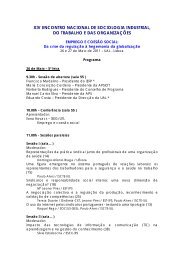Web-based Learning Solutions for Communities of Practice
Web-based Learning Solutions for Communities of Practice
Web-based Learning Solutions for Communities of Practice
You also want an ePaper? Increase the reach of your titles
YUMPU automatically turns print PDFs into web optimized ePapers that Google loves.
Conditions and Key Success Factors <strong>for</strong> the Management <strong>of</strong> <strong>Communities</strong> <strong>of</strong> <strong>Practice</strong><br />
moted perspective and the emergent approach, and<br />
also some interesting rein<strong>for</strong>cement links between<br />
them. But also we are conscious that this approach<br />
can motivate some important contradictions, such<br />
as imposing <strong>for</strong>mal structures upon existing CoPs,<br />
or treating as CoP structures which are not. This<br />
is why, in order to advance a future research on<br />
the topic <strong>of</strong> management-promoted CoP we would<br />
suggest a more detailed analysis <strong>of</strong> the specific<br />
dimensions <strong>of</strong> the cultivation process undertaken<br />
and comparisons with the dimensions followed by<br />
organic ones to assess differences in the development<br />
process and goal achievement.<br />
It would also be extremely interesting to sum<br />
up the opinions <strong>of</strong> entrepreneurs regarding their<br />
vision on the strengths and weaknesses <strong>of</strong> the<br />
process <strong>of</strong> cultivating CoP in organizations and<br />
also the experience <strong>of</strong> community members receiving<br />
organizational support so as to compare<br />
the perceived pros and cons. Likewise, it would<br />
be a good idea to evaluate which is the present<br />
general situation in the industry regarding the<br />
existence <strong>of</strong> CoP in organizations, and the way<br />
they have been originated and developed.<br />
Finally, the study <strong>of</strong> the alignment between<br />
individual and community interests is also an<br />
important issue, not only <strong>for</strong> our research focus,<br />
but also <strong>for</strong> CoP area in general. In fact, analyzing<br />
open-source s<strong>of</strong>tware communities it is possible<br />
to note that they are effective communities, very<br />
<strong>of</strong>ten more effective than communities cultivated<br />
within organizations. This example can thus be<br />
extended to organizations themselves, in which<br />
it is obvious that it would be necessary to understand<br />
what CoP already exists and which kind <strong>of</strong><br />
interest and goals are they serving.<br />
CONCLUSION<br />
Contributions<br />
The main contribution <strong>of</strong> our study is demonstrating<br />
that CoP’s can be promoted and led by man-<br />
agement teams to achieve organizational goals,<br />
and this will not be an obstacle <strong>for</strong> their right<br />
development if they are honest with the means used<br />
<strong>for</strong> that purpose. To be honest means accept the<br />
four elements that constitute a CoP and working<br />
to develop them and not weaken them.<br />
As we have seen, some <strong>of</strong> the measures that can<br />
weaken the development <strong>of</strong> the community, can<br />
have accelerate its emergence, so it’s important<br />
to be conscious <strong>of</strong> the evolutionary process that<br />
the CoP will continue in case <strong>of</strong> success.<br />
This study <strong>of</strong>fers interesting insights <strong>for</strong> the<br />
implementation <strong>of</strong> communities <strong>of</strong> practice understood<br />
as a tool <strong>for</strong> knowledge management and <strong>for</strong><br />
improving competitiveness in organizations.<br />
The reflection made on the challenges <strong>of</strong> the<br />
creation <strong>of</strong> communities <strong>of</strong> practice clarifies possible<br />
uncertainties or incoherencies that could<br />
appear after reading the theory on these communities,<br />
as well as their applicability on a practical<br />
level. It also analyzes the various documented<br />
real experiences, which can contribute to better<br />
understand concepts such as design, cultivation <strong>of</strong><br />
communities, promotion <strong>of</strong> communities, organic<br />
communities, etc.<br />
Limitations <strong>of</strong> the Study<br />
The most important limitation <strong>of</strong> this investigation<br />
projects are the following:<br />
• All the cases <strong>of</strong> CoP studied are established<br />
within organizations, except <strong>for</strong> the frees<strong>of</strong>tware<br />
community experience. The important<br />
knowledge connection with clients,<br />
procurers, public bodies, universities and<br />
other actors <strong>of</strong> the innovation system and<br />
the role that CoP’s can play on it, has been<br />
out <strong>of</strong> question.<br />
• Most <strong>of</strong> the experiences were successful, no<br />
failure. This is the reason why these experiences<br />
allow the detection <strong>of</strong> Success Key<br />
Factors. Nevertheless, failure could occur<br />
during CoPs’ cultivation process, even if the<br />
325



